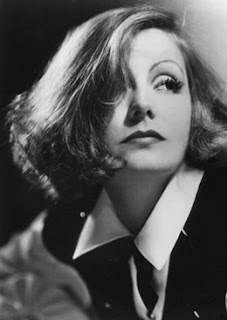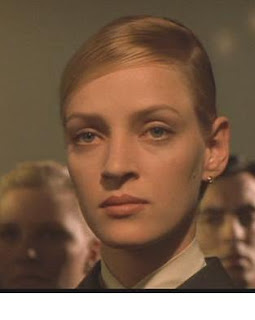- Attractive
- Easy
- Manipulative
- Dumb
 Blonde actresses were very poplar in golden age Hollywood. Greta Garbo, Marlene Dietrich, and Mae West all helped carve out the reputation of blondes. I picked these three intentionally because they show something important. Early on, blondes weren't really stereotyped. They were sexy, of course, but the type of sexy was not rigidly determined. Garbo was sophisticated, feminine, and exotic. Dietrich was also
Blonde actresses were very poplar in golden age Hollywood. Greta Garbo, Marlene Dietrich, and Mae West all helped carve out the reputation of blondes. I picked these three intentionally because they show something important. Early on, blondes weren't really stereotyped. They were sexy, of course, but the type of sexy was not rigidly determined. Garbo was sophisticated, feminine, and exotic. Dietrich was also  exotic, and she sometimes also played a sophisticated type, although she could just as easily step into the role of the "fallen" woman. But her sexuality depended on her masculinity. Assertive, with a powerful stare, and a deep voice, her slim strong body was often dressed in men's clothing styles. West defined a certain type of sexuality, a legacy that lived on undiminished through my childhood, at least. I don't know how many allusions to Mae West I consumed through my diet of Saturday morning and weekday afternoon cartoons. Brazen, assertive, comedic, but intensely feminine with her generous, curvaceous figure, I think she was a powerful influence on my notions of what makes a woman sexy.
exotic, and she sometimes also played a sophisticated type, although she could just as easily step into the role of the "fallen" woman. But her sexuality depended on her masculinity. Assertive, with a powerful stare, and a deep voice, her slim strong body was often dressed in men's clothing styles. West defined a certain type of sexuality, a legacy that lived on undiminished through my childhood, at least. I don't know how many allusions to Mae West I consumed through my diet of Saturday morning and weekday afternoon cartoons. Brazen, assertive, comedic, but intensely feminine with her generous, curvaceous figure, I think she was a powerful influence on my notions of what makes a woman sexy.
In the 30s, blondes could be any type of woman, so long as they were sexy (but, then again, all women have to be sexy in Hollywood, a fact Raymond Chandler railed against as degenerate and wearying in The Little Sister). But by the time Marilyn Monroe comes on the scene, the "blonde" has definitely become much more of a type. Now, to be sure, Monroe contributed to the construction of the trope that ensured she would never get a serious movie role, but in order to become who she did, she also had to become a blonde. She inhabited, filled, and expanded (dare I say "filled out") the blonde type, but it was there for her to step into in a way that it wasn't during the 30s.
So what happened in between? Hair coloring. With the actual or ostensible popularity of blondes among men, women who wanted to lure men for fun or profit were more likely to go blonde. From the 30s to the 50s, the reputation of fake blondes was built, and, since most people can't tell the difference, and people tend to generalize, and women often get petty and backbiting, the stereotype was expanded to include all blondes.

The heyday of stereotypes in movies and TV was the 70s. Watching movies and especially TV, you know exactly what a character is going to be like and what is going to happen to them by looking at them. A few examples should serve: Suzanne Sommers. Farrah Fawcett. Jane Fonda. Not all of these women were ditsy, but they played the type. And you knew it from the second you saw their hair.
Now, I would like to believe that we've moved beyond this, but it's still pretty common for blondes to be represented as shallow and ditsy. Despite the recent work of blonde actresses portraying some smart women--Gwyneth Paltrow, Uma Thurman, and Scarlett Johansson to name a
 few--the default is still that blondes are comedically dumb and often shallow. We expect it in comedies, but it's in dramas as well. Consider the original cast of Lost. The serious women are brunettes, the helpless/doomed ones are blondes. It often seems that the only way a blonde woman can be intelligent is if her intelligence is in the service of her sexuality (e.g. Tricia Helfer in BSG).
few--the default is still that blondes are comedically dumb and often shallow. We expect it in comedies, but it's in dramas as well. Consider the original cast of Lost. The serious women are brunettes, the helpless/doomed ones are blondes. It often seems that the only way a blonde woman can be intelligent is if her intelligence is in the service of her sexuality (e.g. Tricia Helfer in BSG).


3 comments:
Good to see the Pleasure Domes up and running!
Are today's starlets less likely to be blonde? (Megan Fox comes to mind...but who else?).
They are less likely to be blondes. Anne Hathaway, Natalie Portman, and Tina Fey have all come into superstardom recently as brunettes. But, of course, brunettes are another subject entirely . . .
Anne Hathaway really came into (adult) superstardom with The Devil Wears Prada, right? And wasn't she cast there as the intelligent, anti-shallow woman? (The anti-Elle from Legally Blonde.)
Post a Comment